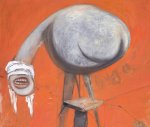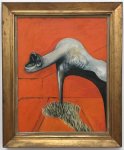IdleRich
IdleRich
Jacob's Ladder too.
Damn I was just gonna say that.
Jacob's Ladder too.
This bit seems pretty facile to me... they look similar so they must have the same cause.The surprising formal similarities of their work — the way limbs are distorted, the overall shapes of bodies, the relation of figures to background and to one another, the use of neat tailor’s clothes, the gesture of hands, the range of colours used - are the result of both men having complementary attitudes to the same crisis.
This bit seems pretty facile to me... they look similar so they must have the same cause.
The chief character is a painter of implied genius who fakes paintings by the early Flemish masters, or rather paints new works in their style and then forges the signature. His motive for doing this is not cash but is similar to that which drives his father, a New England clergyman, from the orthodox church to various forms of pagan sacrifices; both of them realize that true individuality is bound to be destroyed by the modern cult of personality and so seek a past order of values which places less emphasis on self-consciousness. Or at least that is their rational motive; their irrational motives are ritualistic and center around the death of the mother. A description of the dark meaning of their even darker pilgrimage takes up a large part of the book: the rest is mostly a satire on the false glitter of New York bohemianism.…


The scream is stolen from Munch’s iconic painting. What a heist. So huge a theft that no one mentions it. You search David Sylvester’s Looking Back at Francis Bacon (2000) in vain for any reference to Der Schrei. Instead, Munch is dismissed brusquely as a non-influence because he is Expressionist, a painterly stance Bacon explicitly repudiates: ‘I’m not really saying anything [as he thought Munch was], because I’m probably much more concerned with the aesthetic qualities of a work than, perhaps, Munch was.’ So, a rather disingenuous denial of content. But it is unsurprising to me that Giacometti, later a friend and ally, should have initially dismissed Bacon’s work as Expressionist. Bacon takes Munch’s kitsch Nordic universal scream, critiques it and refines it. He gives it teeth.
